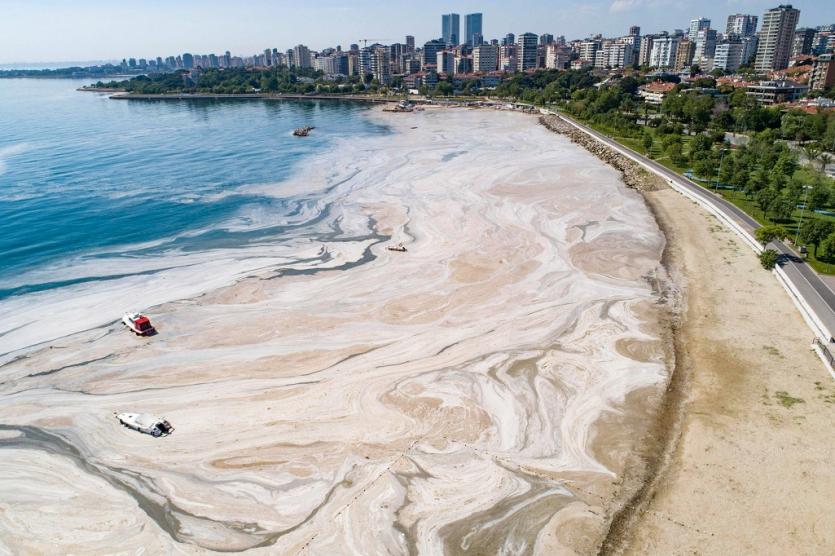Mucilage, or "sea snot," covers the shorline in Istanbul, Turkey, June 6, 2021. Photo:AFP
By Patryk Krych | The World Daily | JUNE 8th 2021
A so-called sticky “sea-snot,” caused by rising global temperatures has been observed in the Sea of Marmara in Turkey, leading to the deaths of hundreds of fish in what experts are warning may be some kind of new viral outbreak.
The crisis had begun back in December, with environmental experts claiming that the sticky, web-like slimy substance is the result of phytoplankton overproduction, which occurs through a mixture of sea waters getting hotter due to climate change, and the pollution of both industrial and household waste.
Both divers and fishermen have taken notice of the crisis, with fish dying on mass and washing up along the coast, and corals and sponges becoming coated in thick layers of the snot-like substances to an often-fatal degree.
“We used to throw a few nets in twice a night and get three to five kilos of fish from each,” said Omur Karisik, 35, who’s been fishing in Turkey’s Sea of Marmara since he was 15 and presently has a family to support. “Now we throw 10 nets in again and again and get the same amount of fish in total.”
He added: “Over the last four days I have spent 1,000 lira ($115) on fuel and other expenses, but I perhaps made 1,200 or 1,500. If it carries on like this I will have to give up fishing.”
Fisherman like Karisik have their entire livelihoods at stake, as their jobs have been stalled over the past 6 months. The worst hit place by the mucilage was Erdek, a resort town found in the South. It’s been reported that the mucus’ attachment to nets has in some instances been so strong that it’s torn the nets apart, only adding to the pollution.
The dean of Bandırma Onyedi Eylül University’s marine faculty, Mustafa Sari, had warned the government many years ago about the imminence of such a mucus explosion in the Sea of Marmara but he had not been listened to. The higher levels of nitrogen and phosphorus in the inland sea, caused by the dumping of untreated waste and runoff, were already enough of a problem for the sea’s marine ecosystems.
Over the past many decades, according to dean Sari, governments and municipalities alike have failed to give priority to the environments and instead continued in their practices of dumping untreated waste and agricultural runoffs into the waters.






